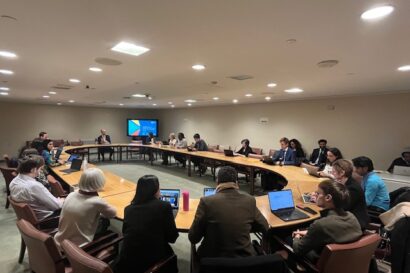Tax and law courts are not strangers. In fact, courts are often called to adjudicate the interpretation of complex tax legislation. However, they are rarely invited to pronounce on the constitutionality – rather than the simple legality – of the way in which governments choose to organise tax collection. That said, the High Court of Trinidad and Tobago has been engaged in just such a case over the past year. I was invited by the Ministry of Finance to provide expert advice. Underlying it is a wider story about obstacles to reforming tax administration more generally, including the intensity of public sector trades union opposition to much-needed reforms that seem to threaten existing employment privileges.
Scoring Tax Administrations: Trinidad and Tobago scores high on corruption
Trinidad and Tobago is a middle income country struggling with a very poor quality tax administration. The best evidence we have comes from TADAT (Tax Administration Diagnostic Tool), an organisation that operates under the aegis of the International Monetary Fund. Over the past six years, TADAT has been organising expert peer assessments of the quality of national tax administrations. After the assessment, each tax administration is scored, from 1 (low) to 7 (high) on 28 different dimensions of tax administration. As of March 2020, 73 tax administrations had been assessed scoring an average of 3.3 on all dimensions. Nearly all of these assessed administrations were in low- or middle-income countries, including Trinidad and Tobago which scored 2.1. Moreover, only 18 of the 73 tax administrations received an average score of less than 2.1.
Until 2019, the quality of national tax administrations was also measured through the Paying Taxes survey organised by the World Bank. The latter suggested an even lower relative ranking for Trinidad and Tobago’s Inland Revenue Division (IRD). In fact, a Ministry of Finance official explained to me once that when she was posted to the IRD a few years ago, the organisation was still refusing to accept credit card payments of tax liabilities and insisting that payments were to be made in cash or by cheque. Red alert for corruption!
The Minister’s radical approach to combatting corruption
The challenge facing Trinidad and Tobago’s Minister of Finance was not so unusual. He was formally responsible for – but not always able to control – an Inland Revenue Division and a Customs and Excise Division that were inefficient and corrupt. In tax administration, corruption and inefficiency go together, corruption is easier to conceal beneath complex and out-dated manual organisational processes. To face these challenges, the Minister adopted an organisationally radical and politically tough policy, yet not so unusual in international perspective, of replacing those two Divisions with a semi-autonomous revenue authority (SARA).
What is a semi-autonomous revenue authority?
ISORA, the International Survey on Revenue Administration, identifies two basic national tax administration forms.
- ‘Within-Ministry’ organisations are the historical norm for most countries, including Trinidad and Tobago, and have three defining features:
- They are part of the Ministry of Finance, and thus formally under the direct authority of the Minister.
- Their staff are employed on the same basic conditions as other public servants.
- Each tax collection organisations specialises in specific tax categories . In Trinidad and Tobago, the Customs and Excise Division focuses on collecting import duties and excise duties on products like tobacco and alcohol while the Inland Revenue Division collects mainly corporate and personal income taxes and VAT.
2. SARAs, on the other hand, are in many respects quite diverse but with three defining features:
- They are distinct organisations, separate from the Ministry of Finance, and responsible to a Board whose members are appointed by the government – often in consultation with national organisations representing the private sector, tax advisers or chartered accountants.
- The managements of SARAs are in varying degrees exempt from standard civil service rules regarding recruitment and procurement. Their employees may be hired more flexibly and paid differently (in practice, higher) than ordinary public servants.
- SARAs are expected to integrate the routine operations of the separate Divisions from which they were originally formed, to the extent of greatly reducing or even breaking the historic differentiation of tax agencies around the collection of specific taxes. In the more integrated SARAs, individual staff members are no longer focused on collecting either income tax, customs duties, excise duties, property tax, or VAT etc. Instead, each specialises in one particular step of the tax collection process: registering taxpayer, overseeing the filing of tax returns, assessing taxes due on the basis of those returns, billing, dealing with arrears, auditing, dealing with tax disputes, IT, internal vigilance (anti-corruption), human resources, staff training, taxpayer services, or taxpayer education etc.
Trinidad and Tobago transitions to a SARA
So, why did the government of Trinidad and Tobago pass the 2021 Revenue Authority Act to integrate the Inland Revenue and the Customs and Excise Divisions into a SARA?
a. Overt justifications
There is an overt public justification, available from a wide range of documents and speeches, and we can assume, an equally important but more sensitive justification voiced mainly in private. It states that the SARA is intrinsically a more efficient mechanism for collecting taxes, especially when in the wider world economic activities and tax collection are rapidly becoming more digitalised. If well managed, digitalisation brings three major benefits:
- It reduces routine operating costs for both tax collectors and taxpayers.
- The shift from an organisation structured around tax type toward an organisation structured around specialist function as summarised above, depersonalises the collection process. Indeed, the tax collector no longer needs to meet the taxpayer to assess their liabilities or ensure the right forms are completed. Similarly, the tax collector no longer controls the way a taxpayer’s tax returns move through the organisation. By reducing these personal interactions between tax collectors and taxpayers, digitalisation enables procedures to over-rule relationships, the latter being a main pillar of routine corruption.
- Digitalisation also enables tax collectors to access comprehensive information regarding taxpayers’ material situations and tax liabilities, through the integration and analysis of data from a wide range of sources. Therefore, it is much harder for a taxpayer to under-state the size and profitability of their business if the revenue authority can easily and digitally access and check the company’s profit tax returns against its VAT returns, as well as its import record and its water and electricity bills. In parallel, the revenue authority can also check the owner’s personal income tax returns against their recent property purchases, vehicle ownership, bank account, and shared ownership properties. Notwithstanding the fact that a worrying ‘big brother’ aspect can emerge from all this, but the potential gains in terms of reducing tax evasion are of considerable importance.
b. Probable underlying reason
The Revenue Authority Act was marketed to the Trinidad and Tobago Parliament and public on these kinds of efficiency grounds, including the potential benefits to the taxpayer. But it is very likely that the Minister of Finance had an additional reason for wanting to establish a SARA as an alternative to attempting to reform tax administration through a step-by-step process without radical organisational reform.
Indeed, he likely concluded, as have many other Ministers of Finance facing similar challenges, that the existing tax collection staff, strongly organised in trade unions and well entrenched behind highly restrictive public service employment rules, were very well placed to win a long war of attrition through dogged resistance. SARAs are often established not (only) because they are believed to be more efficient than ‘within-Ministry’ organisations, but because this change provides opportunities to to dispense with at least some less competent or more corrupt existing staff, to break down (corrupt) inter-personal networks, and to employ new younger staff possessing much needed skills in, for example, IT and data analytics. However, “wise” Ministers of Finance rarely say these things publicly, at least not before reform is achieved.
The Trinidad and Tobago Public Service Association retaliates: the due process course of law
The Trinidad and Tobago Public Services Association was well aware of what was at stake. In 2022 they brought a suit against the Minister of Finance and the Revenue Authority Act to the High Court. They made their case at two different levels.
a- A constitutional matter
The constitutional aspect had to be invoked to present valid grounds to resort to legal action against an Act of Parliament. As summarised by the judge, the constitutional element of the claimants’ case was as follows:
“First, there are certain core government functions/intrinsically governmental or functions that are essentially within the province of government and which must be entrusted to public officers, i.e. people who enjoy the protections of Chapter 9 of the Constitution; and second, the transfer of intrinsically governmental functions to people who are not public officers and who do not enjoy the protections of Chapter 9 is therefore a breach of the Constitution.” [source: author’s own]
SARA staff will not enjoy the protections of Chapter 9 of the Constitution.
b. A policy matter
The issue of constitutionality was however also used as cover to introduce more substantive arguments against replacing ‘within-Ministry’ arrangements by a revenue authority. Initially, the claimants asserted that the revenue authority arrangement was strange and rare, and therefore inappropriate to Trinidad and Tobago. In my initial affidavit to the Court, I pointed out that not only ‘within-Ministry’ arrangements and revenue authorities are found in approximately equal numbers globally, but in fact, the numbers of revenue authorities are tending to increase slightly. Thus, the ‘strange and rare’ argument was invalid.
I also pointed out that the actual evidence does not unambiguously support the case in that the revenue authority model provides a better way of collecting taxes than ‘within-Ministry’ arrangements. The simplest yardstick to measure the long-term performance of tax collection agencies is through the levels of revenue collection relative to GDP. The number of revenue authorities in the world expanded quite fast in the 1990s and 2000s, especially in Anglophone Africa. I referred the court to three excellent pieces of historical and econometric research (check the Further reading section below) that tell us respectively that establishing a revenue authority typically does not lead to a greater subsequent increase in revenue than retaining ‘within-Ministry’ arrangements. That evidence was then enthusiastically reported back to the court in the counter-affidavits commissioned by the claimants. They omitted however to mention the evidence that I had provided demonstrating that revenue authorities seem on average to behave in more transparent and accountable ways than do ‘within-Ministry’ tax divisions, and in various other ways often seem to have the edge.
Concluding the case: the judge’s ruling
Against this backdrop, the Hon. Justice W. R. A. James issued his judgement on the 17th of November 2023. While noting that revenue authorities are not in fact the strange and rare creatures that the claimants had asserted, he (rightly) declined to rule on the arguments reflecting on the best form of tax administration, on the grounds that this is a policy matter for the government over which the court has no jurisdiction. Hence, he made his ruling solely on the constitutional issue, rejecting the claim that it is unconstitutional for people who do not enjoy the protections of Chapter 9 of the Constitution to be employed collecting taxes.
However, the story does not end here, with the subsequent successful birth of the Trinidad and Tobago Revenue Authority. The Public Service Association, given what is at stake for their members, immediately appealed the ruling.
Are there wider implications? I suggest:
- The tide of history is running slightly in favour of the combination of revenue authorities and the digitalisation of tax collection.
- Any government that attempts the ‘big bang’ reform of replacing ‘within-Ministry’ tax collection arrangements with a revenue authority risks trench warfare with highly motivated and well-resourced public-sector trade unions.
- There are many variants of the revenue authority model, and many ways for governments to reap – or fail to reap – the benefits of creating one. It is not worth fighting a major battle to establish one if there is no intention to support it, nurture it, and ensure that it continuously reforms and adapts.
Writer’s notes and acknowledgements:
I am grateful to the TADAT Secretariat for proving me with the results of most TADAT evaluations for research purposes.
While the court’s ruling has not been released yet on their website, I am in possession of the file, hence the detailed information that I was able to provide.
Further reading:
Dom, R. 2019. “Semi-Autonomous Revenue Authorities in Sub-Saharan Africa: Silver Bullet or White Elephant.” Journal of Development Studies 55 (7):1418-35. https://doi.org/10.1080/00220388.2018.1469743
Jeppesen, M. 2021. “What we hoped for and what we achieved: Tax performance of Semi-Autonomous Revenue Authorities in sub-Saharan Africa.” Public Administration and Development 41 (3):115-127. https://doi.org/10.1002/pad.1952
Sarr, B. 2016. “Assessing Revenue Authority Performance in Developing Countries: A Synthetic Control Approach.” International Journal of Public Administration 39 (2):146-156. https://doi.org/10.1080/01900692.2014.1003382




